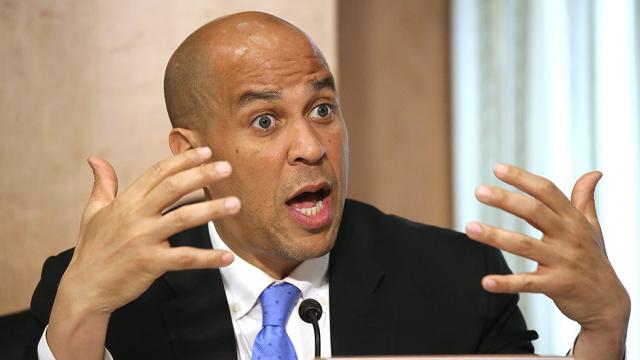By: Jeremy Dys – thehill.com – April, 26, 2018
While most coverage of Mike Pompeo’s nomination for secretary of State focused on the battle for votes in the Senate, the process also featured the latest in a disturbing trend of senators apparently violating Article VI of the U.S. Constitution.
Last week, Senator Cory Booker (D-N.J.) was the latest U.S. senator to add his name to a growing list treating the Constitution’s unequivocal rejection of a religious test for office like the “Pirates of the Caribbean’s” Barbosa treats “The Code”: “more what you’d call ‘guidelines’ than actual rules.”
Article VI, specifically the final clause, guarantees that “no religious Test shall ever be required as a Qualification to any Office or public Trust under the United States.”
Someone tell the Democratic caucus of the U.S. Senate.
Outraged by Pompeo’s beliefs about marriage and human sexuality, as shared by millions of his fellow Americans, Booker threw question after question at Pompeo, a Christian, questioning whether he could possibly lead the U.S. Department of State with such orthodox beliefs. With the limited time allotted, Booker did not explore Pompeo’s credentials, did not evaluate his education, experience, or wisdom — at least not with the same ferocity with which he attacked Pompeo’s religiously-based convictions.
And, it did not end inside the hearing room. Booker quickly took to social media, publicly mocking Pompeo — and thus any American who may morally agree with him — for the implications of his religious beliefs. He climbed behind the pulpit of Facebook and delivered a senator’s sermon at the nominee, quoting from the Bible as he announced he would not vote to confirm Pompeo as secretary of State.
Sadly, nominees have come to expect this from the U.S. Senate, so Pompeo was prepared and took the aggressive questioning in stride, rightly explaining that he maintains “respect for every individual regardless of sexual orientation,” and would, under his leadership, do all he could to improve a dispirited State Department.
While Pompeo managed to ably navigate around the senator’s test, other nominees may not be so fortunate. For them, I have some advice: assert Article VI.
Those who crafted the Constitution meant to ensure that good and wise citizens of every stripe, religious or not, is able to serve this country. Our framers understood the great benefit to our nation when many diverse voices, from a multitude of religious, cultural, and philosophical backgrounds are welcomed to serve in making our country one.
Booker is not the first, nor likely the last, to violate Article VI. Sen. Bernie Sanders (I-Vt.) famously attacked the religious convictions of Russell Vought, President Trump’s nominee for deputy director of the Office of Management and Budget.
Sens. Dick Durbin (D-Ill.) and Dianne Feinstein (D-Calif.) imposed their religious test upon Judge Amy Coney Barrett, with Feinstein famously condemning Barrett for the “dogma” that “lives loudly within” her.
Enough.
It would be good for our republic if the next nominee faced with the bullying and grandstanding that passes for “advise and consent” were to opt out of the political theater. Nominees faced with unconstitutional inquiries into their religious beliefs have every right to respond with a respectful, “Senator, that question asserts a religious test for office. Based on Article VI of the Constitution, I will not answer your question.”
Of course, the offending senator will gripe and complain. Those inclined to trample upon the limitations of government always do. But, in the end, the vision our founders had of welcoming everyone to share in the diverse governance of our republic will be preserved.
More importantly, those watching across the nation — Christians, Muslims, Jews, and others — will appreciate knowing that they too are welcome to embrace the promise that any American may participate in this government of, by, and for the people — including religious people. They will not, as they should not, be forced into choosing between defending or abandoning their religious convictions, regardless of how antiquated one senator finds such beliefs.
Senators can vote for or against nominees for nearly any reason or no reason at all. But when they question a nominee’s religious faith, pronounce it disagreeable, and withhold his or her vote because of the nominee’s faith, senators violate the Constitutional promise of imposing no religious test for public office.
To see this article, click read more.
 Listen Online
Listen Online Watch Online
Watch Online Find a Station in Your Area
Find a Station in Your Area







 Listen Now
Listen Now Watch Online
Watch Online
